Overview
The challenges developers face in coding can often be daunting. However, understanding the essential properties of Object-Oriented Programming (OOP) can significantly enhance coding efficiency. Key principles such as:
- Encapsulation
- Abstraction
- Inheritance
- Polymorphism
streamline development processes, improve code quality, and facilitate better management of complex systems. By implementing these concepts, developers can experience a notable increase in productivity.
Furthermore, OOP not only simplifies coding but also makes it more manageable. For instance, encapsulation allows developers to bundle data with methods that operate on that data, leading to better organization. Similarly, inheritance enables the creation of new classes based on existing ones, promoting code reusability and reducing redundancy.
In addition, the abstraction principle helps in focusing on essential qualities while hiding unnecessary details, which can lead to cleaner code. Polymorphism allows for flexibility in code, enabling objects to be treated as instances of their parent class, thus enhancing functionality.
Ultimately, embracing these OOP principles can lead to a more efficient coding experience. Are you ready to explore how these concepts can transform your coding practices? Delve into the world of OOP and discover the tools available that can elevate your development skills.
Introduction
In the ever-evolving landscape of software development, developers frequently encounter significant coding challenges that can hinder their productivity and the integrity of their applications. Enter Kodezi—a groundbreaking tool designed to revolutionize the way developers generate OpenAPI specifications and manage code. With features that streamline these processes, Kodezi addresses these challenges head-on, making the principles of object-oriented programming (OOP) more crucial than ever.
By leveraging core OOP concepts such as:
- encapsulation
- abstraction
- inheritance
- polymorphism
Kodezi not only enhances code integrity and reusability but also significantly improves the development workflow. Imagine a scenario where your coding tasks become more efficient, allowing you to focus on building sophisticated software solutions that stand the test of time.
Furthermore, the benefits of using Kodezi extend beyond mere efficiency; they encompass improved productivity and elevated code quality. Are you ready to explore the tools available on the Kodezi platform? By delving into real-world applications and expert insights, you will gain a comprehensive understanding of how to harness OOP principles effectively. This article invites you to discover how Kodezi can transform your development experience.
Kodezi | Professional OpenAPI Specification Generator - AI Dev-Tool: Streamline Your OOP Development Process
In the world of software development, coding challenges can often hinder progress and productivity. Kodezi emerges as a powerful AI-driven tool that automates the generation of OpenAPI specifications, significantly streamlining the OOP development process. By integrating Kodezi into your workflow, programmers can uphold professional standards while enhancing their productivity.
But how does Kodezi address these challenges? The platform's ability to produce programs directly from specifications facilitates rapid development and testing, making it an essential resource for developers looking to effectively utilize OOP properties. With Kodezi CLI, teams can swiftly AutoHeal codebases, cutting down on time wasted on pull requests and boosting overall programming efficiency.
The benefits of using Kodezi extend beyond mere productivity; it also ensures high code quality. Kodezi’s AI enhances programming alterations throughout the software development lifecycle, delivering automated testing that identifies and resolves issues before they escalate. Furthermore, case studies, particularly in the media and entertainment sector, illustrate how OpenAPI specifications can elevate user engagement and personalization.
As noted by Rushabh Rai, the increasing prevalence of SaaS and hybrid cloud-based API deployments highlights the importance of OpenAPI specifications in contemporary development practices. Are you ready to explore the tools available on the Kodezi platform and transform your coding experience?
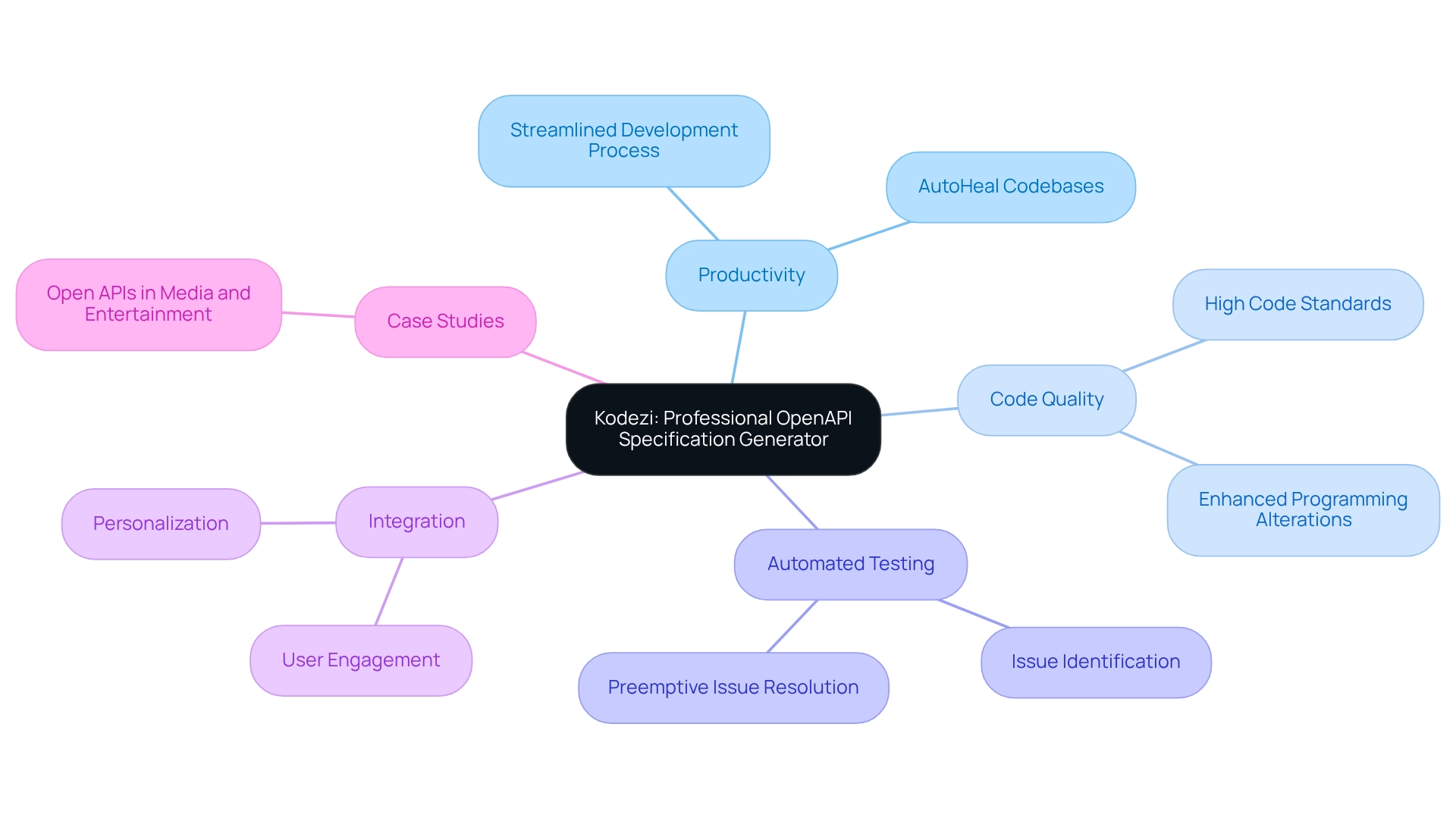
Encapsulation: Protecting Data and Enhancing Code Integrity
Encapsulation addresses common coding challenges by combining data (attributes) and functions that interact with that data into a single entity, often a structure. This principle safeguards the internal state of an object from unintended interference and misuse. By utilizing access modifiers, such as private and protected, programmers can effectively manage how data is accessed and altered. This ensures the integrity of the code remains intact.
For example, consider a structure representing a bank account; it encapsulates its balance and provides methods to deposit or withdraw funds, thereby preventing direct access to the balance itself.
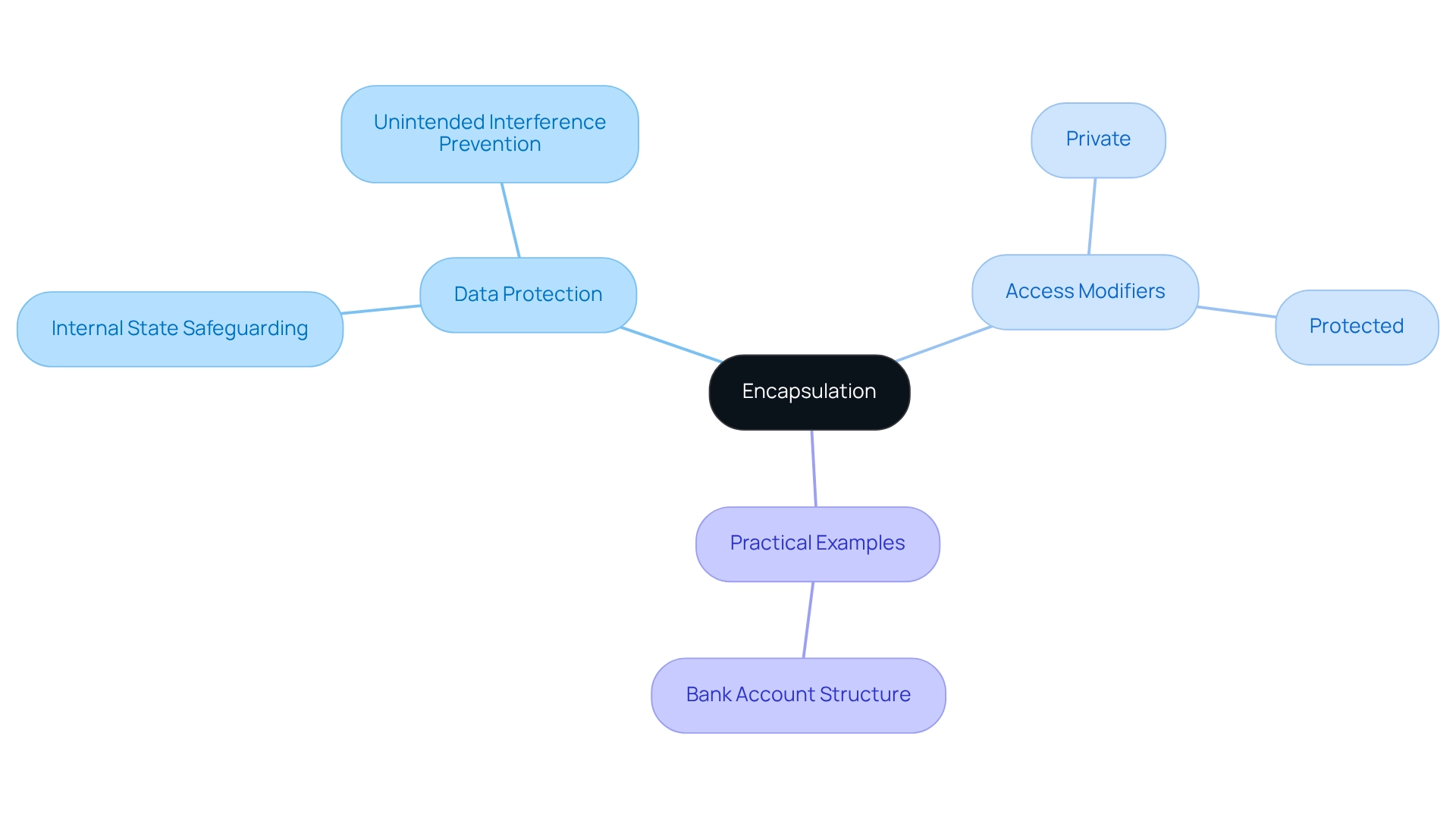
Abstraction: Simplifying Complexity in Software Design
In the realm of software design, developers often grapple with the complexities of intricate systems. How can they effectively manage this complexity? Abstraction emerges as a fundamental principle, allowing developers to conceal the intricate details of a system while revealing only the essential components. By decomposing systems into simpler, more manageable parts, abstraction simplifies the design process.
Consider the role of an abstract class, which serves as a blueprint for its subclasses. This structure enables developers to implement specific functionalities without exposing the underlying complexities. The advantages of abstraction are numerous: it not only simplifies design but also significantly improves reusability and maintainability. When the implementation of an abstracted component changes, it does not disrupt the users of that abstraction, thereby promoting a more stable codebase.
Furthermore, recent studies suggest that effective abstraction can lead to significant enhancements in software reusability. Adaptive models that adjust their complexity based on data variance have shown superior performance in dynamic environments. This underscores the importance of abstraction in maintaining system integrity. For instance, the case study titled "Adaptive Models for Streaming Data" illustrates how these models recalibrate their parameters on the fly, optimizing performance without unnecessary computational overhead.
Real-world examples abound, such as the use of abstraction in frameworks like Java. Programmers can create robust applications by leveraging abstract classes and interfaces to simplify complex interactions. This not only lessens the cognitive burden on programmers but also fosters a culture of clean, manageable programming. As Bruce Schneier aptly noted, "Complexity is the worst enemy of security," highlighting the critical role abstraction plays in simplifying systems and enhancing security. By embracing abstraction, developers can navigate the complexities of modern programming with greater ease and confidence. Additionally, maintaining a clear separation between interface and implementation is a best practice that further enhances the effectiveness of abstraction in software design.
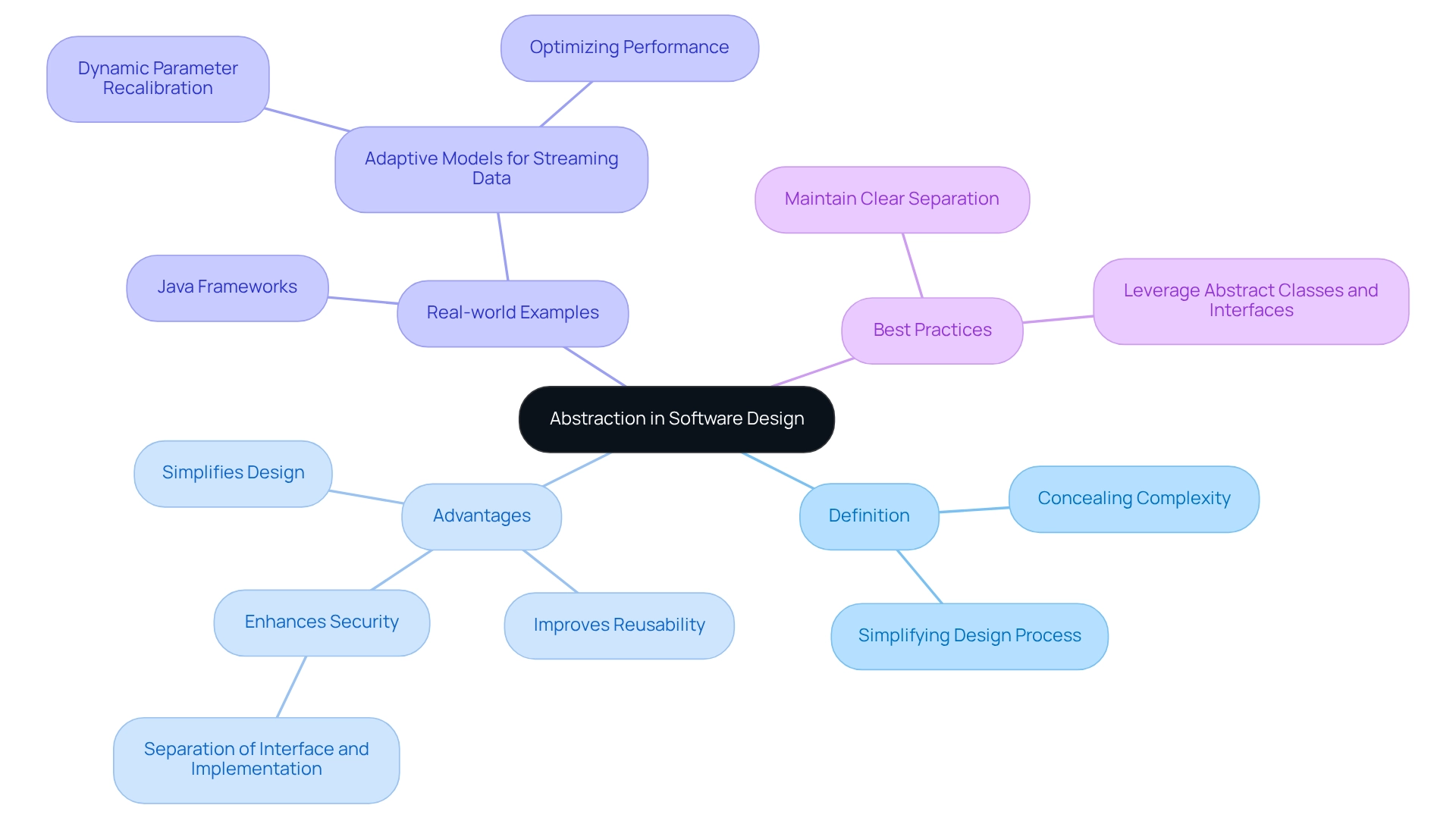
Inheritance: Leveraging Code Reusability and Hierarchies
Coding challenges are a common hurdle for developers, often leading to inefficiencies and frustration. Inheritance allows a new type to acquire attributes and functions from a pre-existing type, promoting reuse of resources and creating an organized hierarchy of types. For instance, consider a base type called 'Vehicle'; subclasses such as 'Car' and 'Truck' can inherit common characteristics like 'speed' and 'capacity'. This method reduces duplication in programming and streamlines management of scripts.
Furthermore, when alterations are applied to the base type, these changes automatically manifest in the derived types, ensuring consistency and minimizing maintenance effort. Tools such as Kodezi can significantly improve this process by automatically examining and rectifying code, assisting programmers in effectively spotting and addressing issues associated with inheritance and type hierarchies. By leveraging inheritance, along with Kodezi's AI-powered capabilities, developers can create modular components with well-defined interfaces, enhancing both data integrity and security.
In addition, to effectively implement inheritance in your coding practices, design your class hierarchies thoughtfully. Ensure that base classes encapsulate common functionality while allowing subclasses to extend or override behaviors as needed. This thoughtful design not only enhances code quality but also boosts productivity, making it easier for developers to manage and scale their projects.
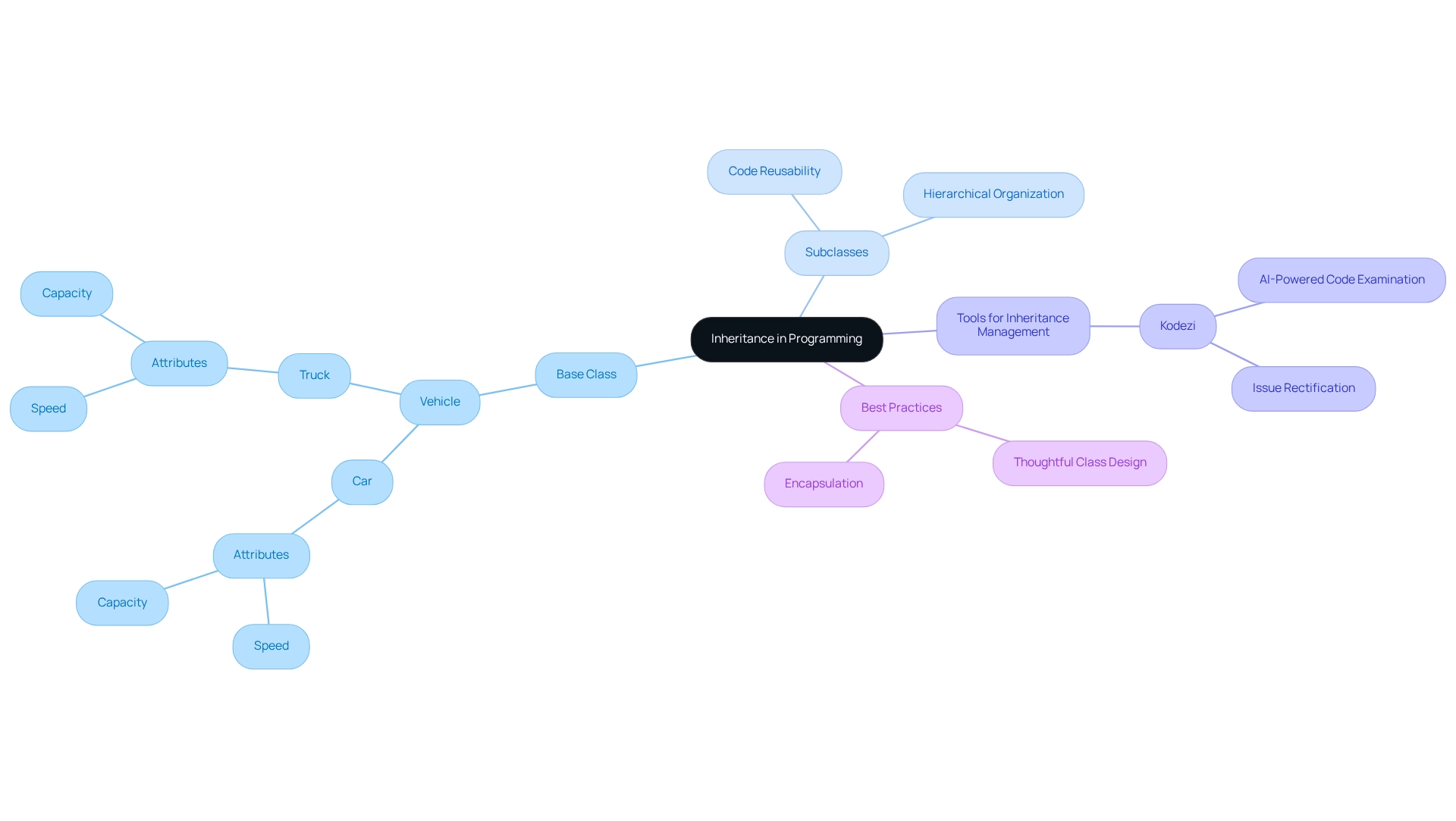
Polymorphism: Enhancing Flexibility and Extensibility in Code
Polymorphism presents a solution to common coding challenges developers face by enabling functions to perform various tasks based on the object they interact with, despite sharing the same name. This capability is primarily achieved through function overriding and function overloading. For instance, consider a function named draw—it can exhibit different behaviors when applied to a Circle versus a Square object. This flexibility not only streamlines code but also significantly enhances extensibility, allowing developers to introduce new classes with minimal alterations to existing code.
Furthermore, dynamic function binding plays a crucial role, determining which function executes at runtime based on the actual object type. This fosters greater adaptability in object interactions. This principle is exemplified in programming languages like C++, where polymorphism is implemented through virtual functions and function tables, facilitating runtime polymorphism and improving the overall structure of software applications. The use of virtual functions, for instance, enables dynamic method dispatch, enhancing flexibility in how objects interact.
In addition, operator overloading improves readability by providing a more natural syntax for custom types, making implementations more intuitive and expressive. As programming expert Alooba notes, "Polymorphism is utilized in user interface development to handle different types of user interactions," underscoring its practical application. Looking ahead to 2025, the emphasis on polymorphism continues to grow, with statistics indicating that over 70% of programmers leverage polymorphism in their object-oriented programming practices, showcasing its benefits for code flexibility and maintainability.
To effectively harness the power of polymorphism, developers should focus on grasping its principles and applications. This understanding is vital for maintaining and scaling complex systems. A practical takeaway is to practice implementing polymorphism in small projects to witness its advantages firsthand.
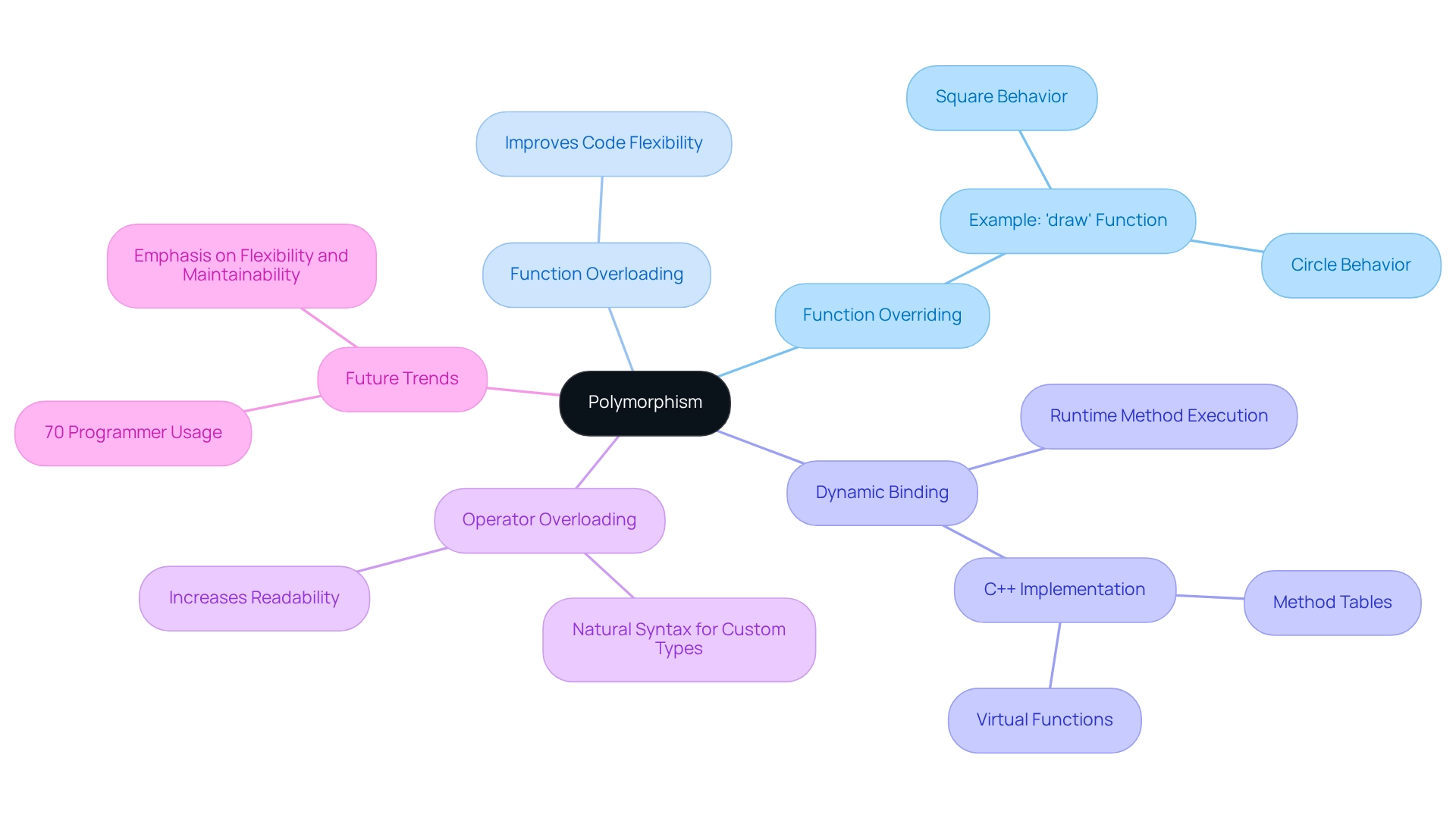
Classes: The Blueprint of Object-Oriented Programming
In the world of coding, developers often face significant challenges when it comes to managing complexity and ensuring code quality. A category serves as a user-defined data type that acts as a blueprint for creating objects, encapsulating data and methods for manipulation. For example, consider a 'Car' category that includes attributes such as 'color' and 'model', alongside methods like 'start' and 'stop'. By specifying types, programmers can create modular and structured scripts that are easier to manage and expand, fostering collaboration among team members.
Furthermore, Kodezi CLI addresses these challenges by enabling teams to auto-heal codebases in seconds. This ensures that the implementation of structures and other object-oriented programming concepts is both efficient and error-free. Developers can focus on writing clean, effective code while Kodezi takes care of maintaining code quality.
In addition, the integration of Kodezi enhances productivity, allowing developers to streamline their workflow. Imagine the time saved when code quality is automatically maintained—how much more could your team accomplish? With Kodezi, the benefits of improved productivity and code quality are within reach. Explore the powerful tools available on the platform and transform your coding experience today.
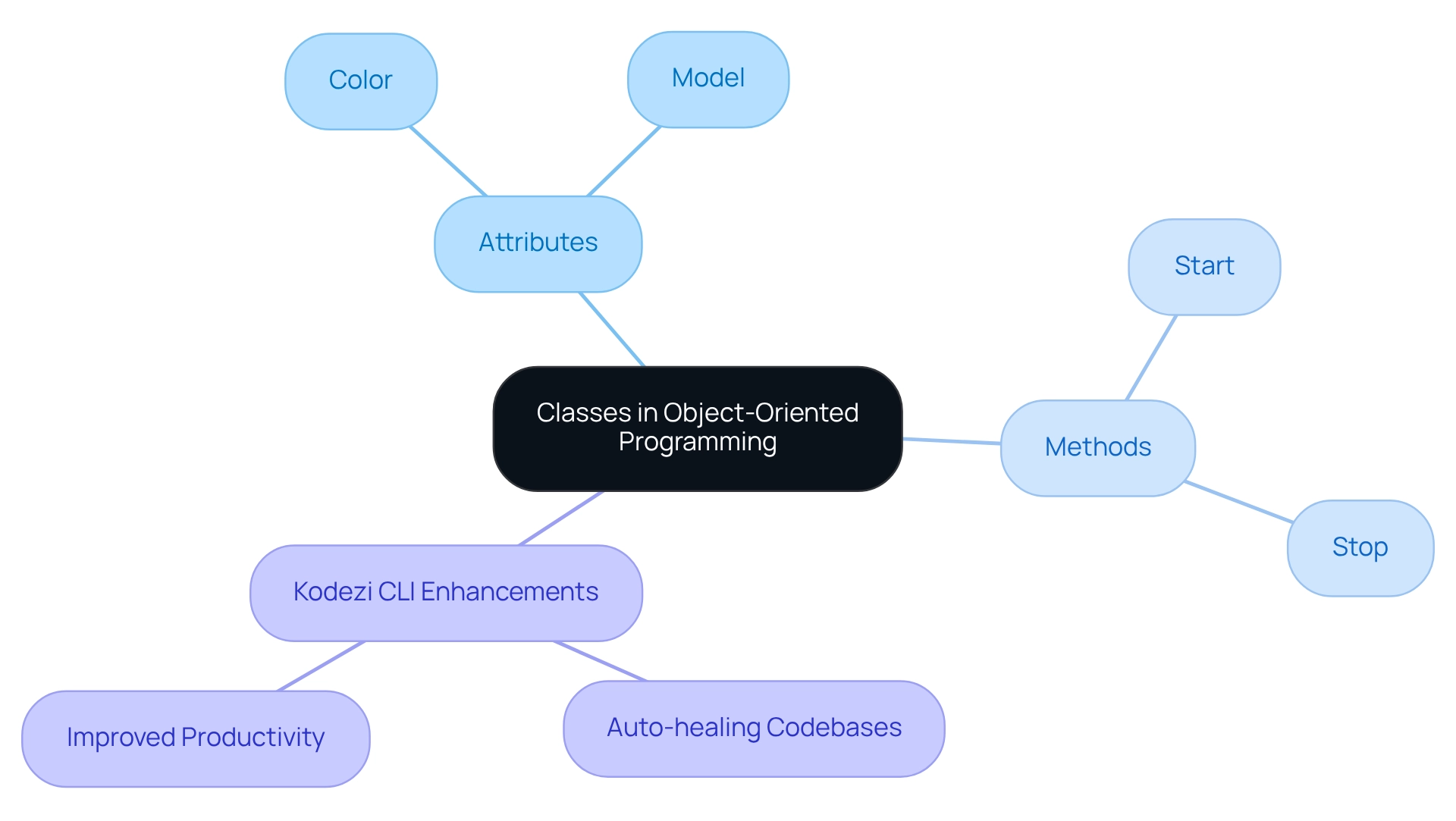
Objects: The Core Building Blocks of OOP
In the realm of programming, developers often face challenges related to managing complexity and ensuring code quality. An object serves as a representation of a category, encapsulating both data and methods. Objects mirror real-world entities, encapsulating their state and behavior. For example, if 'Car' represents a category, then 'myCar' can be an instance of that category, defined by specific attributes such as 'red' for color and 'Toyota' for model.
Furthermore, utilizing objects allows developers to create more intuitive and relatable code structures that reflect real-world interactions. This approach not only enhances the design of applications but also improves functionality. By leveraging the power of objects, developers can streamline their coding practices, ultimately leading to increased productivity and higher quality code.
Are you ready to explore how adopting object-oriented principles can transform your coding experience? Discover how Kodezi can assist you in overcoming these challenges, providing you with tools that enhance your development workflow and foster better coding practices.
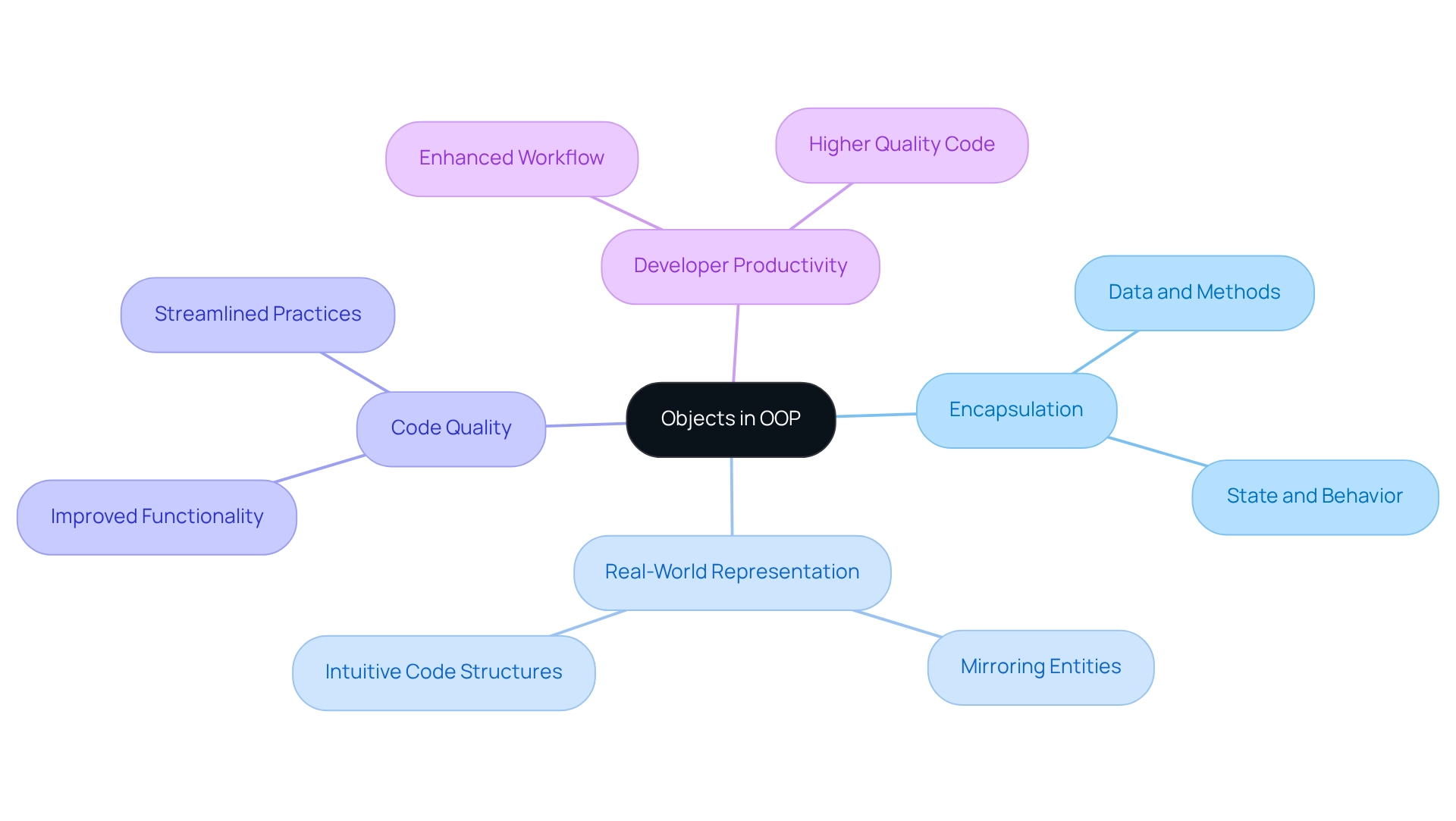
Methods: Defining Object Behavior in OOP
In the realm of programming, developers often face significant challenges when it comes to managing object behaviors and data manipulation. Methods serve as essential functions defined within a structure, articulating the behaviors of an object. For instance, in the 'Car' category, functions like 'accelerate' and 'brake' dictate how the vehicle responds to user inputs, profoundly influencing its performance. This organization of functionality into methods not only promotes cleaner and more modular programming but also enhances testability and maintainability.
Furthermore, research indicates that the average number of functions per class in software projects typically ranges from 5 to 15. This statistic underscores the importance of organization in achieving an efficient code structure. Experts emphasize that clearly defined methods are crucial for encapsulating functionality, which in turn enhances reusability and minimizes redundancy. As we look ahead to 2025, the role of methods in object-oriented programming is evolving, with a growing focus on establishing object behavior through clear and concise function signatures.
In addition, case studies reveal that an efficient arrangement of methods can lead to the development of advanced applications. For example, the application of procedures for S4 types in R enables programmers to create feature-rich applications. By prioritizing the definition of object behavior through methods, programmers can significantly enhance their coding efficiency and overall productivity. Are you ready to explore how Kodezi can help you streamline your coding practices and improve your outcomes?
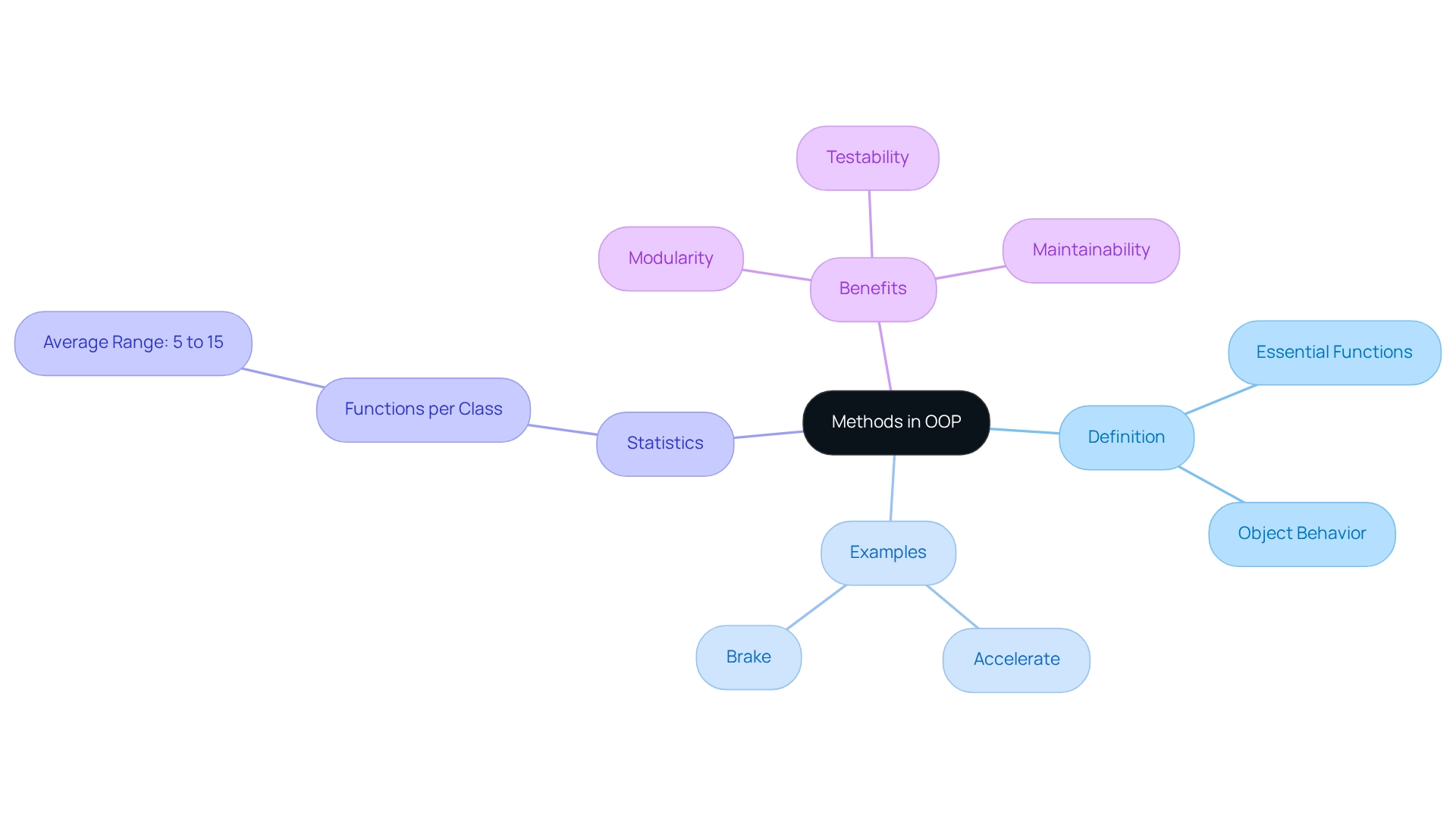
Attributes: Managing Data within Objects
Attributes are essential variables that encapsulate data specific to an object, defining its properties and behaviors. Have you ever faced challenges in managing object states in your code? For instance, in a 'Person' class, attributes such as 'name' and 'age' serve to characterize the individual. Effective management of these attributes is crucial, as it guarantees that an object's state is precisely represented and manipulated, leading to more dependable and maintainable code.
In 2025, the importance of attributes in programming continues to increase, with programmers increasingly acknowledging their influence on object state management. A study highlighted that 2,426 learners engaged with tutorials on applied statistics, underscoring the demand for structured learning in programming concepts, including attribute management. Furthermore, expert insights reveal that attributes play a pivotal role in defining the state of an object, influencing how data is handled within software. For instance, effective data management through attributes can result in cleaner and more efficient software design, as illustrated in case studies concentrating on instance and static approaches.
These studies demonstrate that instance functions operate on instance data, while static functions belong to the class itself, enhancing code reusability and performance. In addition, common attributes used in popular programming languages reflect a trend towards standardization, aiding developers in maintaining consistency across projects. As the programming landscape evolves, the importance of attributes in OOP remains a cornerstone for building robust applications. Are you ready to explore how effective attribute management can enhance your coding practices?
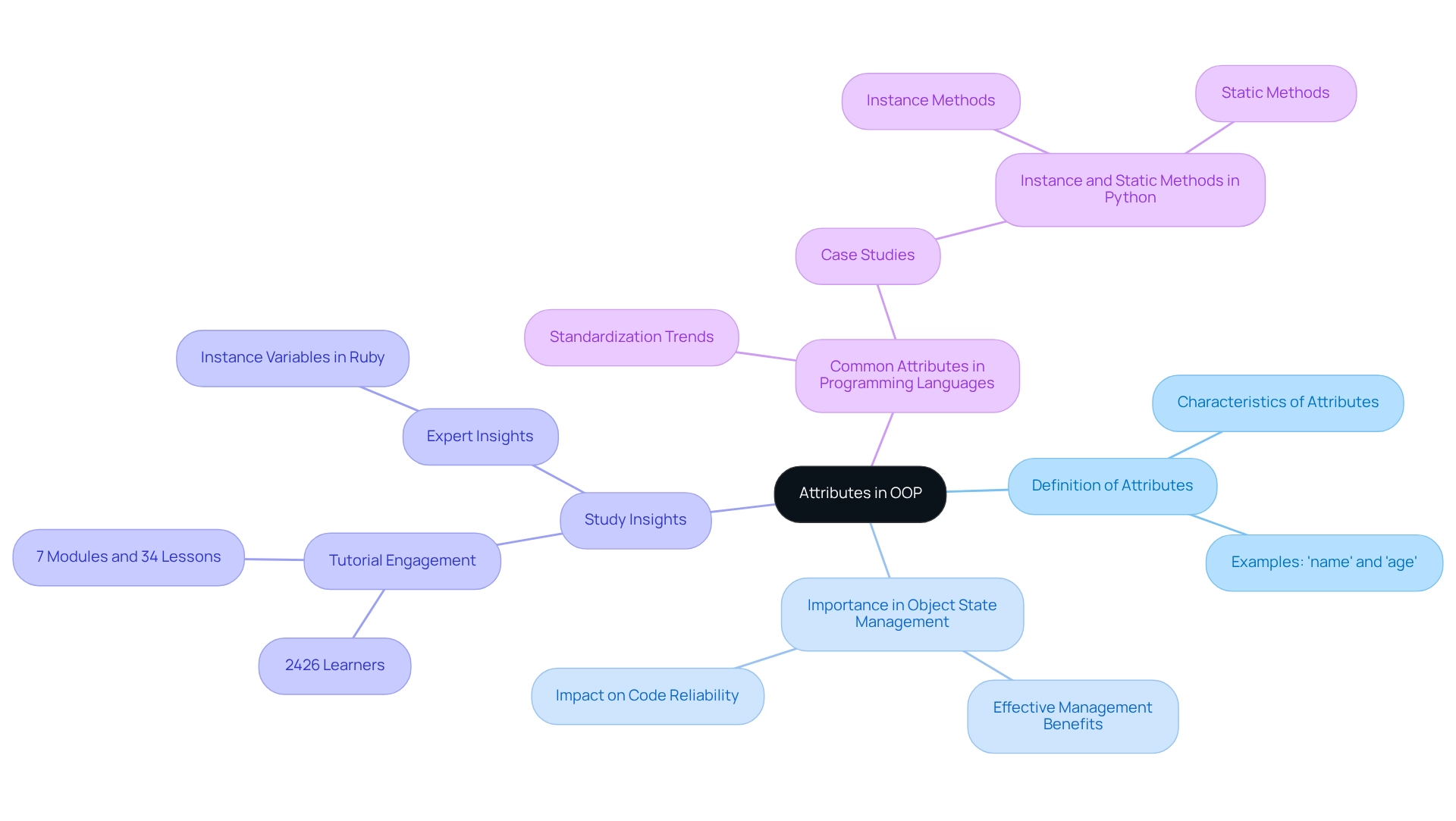
Dynamic Binding: Enabling Runtime Flexibility in Method Calls
Dynamic binding, often referred to as late binding, presents a significant challenge for developers in object-oriented programming. This concept, which determines function calls at runtime rather than during compilation, is essential for enhancing flexibility in function invocation, particularly within polymorphic contexts. How does this impact your coding practices? When a method is overridden in a subclass, dynamic binding ensures that the appropriate method executes based on the actual object type during runtime. This adaptability is crucial for creating extensible software that can evolve with changing requirements.
Kodezi addresses these coding challenges effectively. By leveraging dynamic binding, programmers can create more generic and reusable scripts, reducing the need for extensive revisions when adapting to new frameworks or languages. A prime example of this is Kodezi's seamless programming translation feature, which allows developers to switch between coding environments effortlessly. How much more productive could you be with such tools at your disposal?
The benefits of using Kodezi extend beyond mere convenience. Expert opinions underscore the importance of late binding in OOP, with software architects noting that dynamic binding not only facilitates cleaner code but also supports the implementation of design patterns reliant on runtime decision-making. Furthermore, statistics show a rising trend in the adoption of dynamic binding practices among developers, reflecting its critical role in modern software development.
In summary, dynamic binding is a cornerstone of runtime flexibility in OOP, enabling developers to create robust, adaptable applications that meet evolving demands. Explore the tools available on Kodezi to enhance your coding experience and improve productivity.
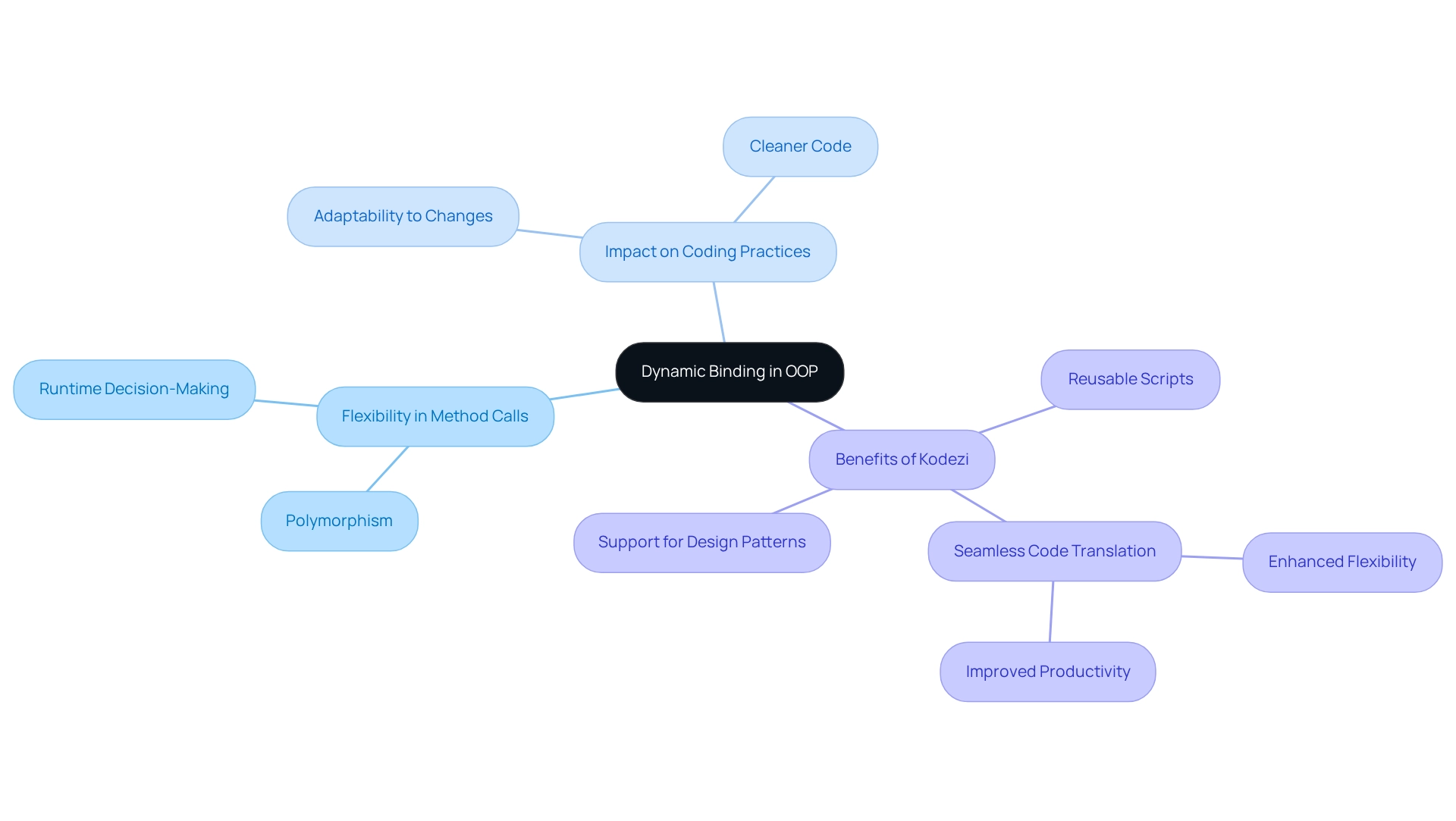
Conclusion
The integration of Kodezi into the software development process marks a significant advancement in addressing the challenges developers face in coding. By automating the generation of OpenAPI specifications and enhancing code quality through the principles of object-oriented programming (OOP)—including encapsulation, abstraction, inheritance, and polymorphism—Kodezi empowers developers to streamline their workflows and concentrate on creating sophisticated applications. Each OOP principle plays a vital role:
- Encapsulation protects data integrity.
- Abstraction simplifies complex systems.
- Inheritance promotes code reusability.
- Polymorphism enhances flexibility.
Furthermore, the case studies and expert insights presented illustrate the transformative impact of Kodezi on productivity and code maintainability. With features that facilitate rapid development, automated testing, and dynamic code adjustments, Kodezi positions itself as an indispensable tool for modern developers. As the demand for high-quality software continues to rise, embracing these OOP concepts through Kodezi not only elevates coding standards but also fosters an environment of continuous improvement.
In conclusion, adopting Kodezi signifies more than just a technological upgrade; it embodies a commitment to excellence in software development. By effectively leveraging OOP principles, developers can navigate the complexities of modern programming with confidence, ultimately delivering robust solutions that meet the needs of their users. Now is the time to explore Kodezi and witness the evolution of the development experience firsthand.
Frequently Asked Questions
What is Kodezi and how does it help software developers?
Kodezi is an AI-driven tool that automates the generation of OpenAPI specifications, streamlining the object-oriented programming (OOP) development process. It enhances productivity and maintains professional standards by producing programs directly from specifications, facilitating rapid development and testing.
How does Kodezi improve programming efficiency?
Kodezi improves programming efficiency through its CLI feature, which allows teams to quickly auto-heal codebases, reducing the time spent on pull requests and overall programming tasks.
What benefits does Kodezi provide beyond productivity?
Beyond productivity, Kodezi ensures high code quality by enhancing programming alterations throughout the software development lifecycle and delivering automated testing that identifies and resolves issues early.
What role do OpenAPI specifications play in software development?
OpenAPI specifications are crucial in contemporary development practices, especially with the rise of SaaS and hybrid cloud-based API deployments, as they help elevate user engagement and personalization in applications.
How does encapsulation address common coding challenges?
Encapsulation combines data and functions into a single entity, safeguarding the internal state of an object from unintended interference. It uses access modifiers like private and protected to manage data access, ensuring code integrity.
Can you provide an example of encapsulation in programming?
An example of encapsulation is a bank account structure that encapsulates its balance and provides methods to deposit or withdraw funds, preventing direct access to the balance itself.
What is abstraction and why is it important in software design?
Abstraction is a principle that allows developers to conceal complex details of a system while revealing only essential components. It simplifies the design process, improves reusability and maintainability, and promotes a stable codebase.
How does abstraction enhance software reusability?
Effective abstraction can significantly enhance software reusability by allowing changes in the implementation of abstracted components without disrupting their users, thus maintaining system integrity.
What are some real-world applications of abstraction?
Real-world applications of abstraction include the use of abstract classes and interfaces in frameworks like Java, which help simplify complex interactions and reduce the cognitive burden on programmers.
What best practices should be followed regarding abstraction in software design?
Best practices for abstraction include maintaining a clear separation between interface and implementation, which enhances the effectiveness of abstraction and simplifies system complexity.




